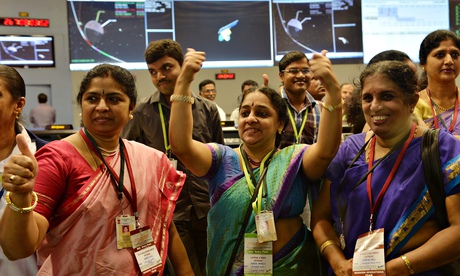On a drizzly afternoon in April, Prince Guillaume, the hereditary grand duke of Luxembourg, and his wife, Princess Stéphanie, sailed through the front doors of an office building in the outskirts of Seattle and into the headquarters of an asteroid-mining startup called Planetary Resources, which plans to “expand the economy into space”.
The company’s engineers greeted the royals with hors d’oeuvres, craft beer and bottles upon bottles of Columbia Valley rieslings and syrahs. In the corner of the lounge stood a vintage Asteroids arcade game; on the wall hung an American flag alongside the grand duchy’s own red, white and blue stripes. Between the two flags was a prototype of a spacecraft designed to roam the galaxy, prospecting asteroids for precious natural resources that would someday – at least in theory – make the shareholders of Planetary Resources very wealthy earthlings indeed.
The nation of Luxembourg is one of Planetary Resources’ main boosters. The country’s pledge of €25m (£22.5m) – which includes both direct funding and state support for research and development – is just one element of its wildly ambitious campaign to become a terrestrial hub for the business of mining minerals, metals and other resources on celestial bodies. The tiny country enriched itself significantly over the past century by greasing the wheels of global finance; now, as companies such as Planetary Resources prepare for a cosmic land grab, Luxembourg wants to use its tiny terrestrial perch to help send capitalism into space.
Space exploration has historically been an arena for grand, nationalistic operations that were too costly, dangerous and complex for civilians to take up without state backing. But now, private companies now want in, raising questions that, until recently, have seemed like mere thought experiments or hypotheticals: who can lay claim to an asteroid and all of its extractive wealth? Should space benefit “all of humankind”, as the international treaties signed in the 60s intended, or is that idealism outdated? How do you measure those benefits, anyway? Does trickle-down theory apply in zero-gravity conditions?
Space is becoming a testing ground for these thorny ethical and legal questions, and Luxembourg – a tiny country that has sustained itself off of regulatory intricacies and tax loopholes for decades – is positioning itself to help find the answers. While major nations such as China and India plough increasing sums of money into developing space programmes to rival Nasa, Luxembourg is making a different bet: that it can become home to a multinational cast of entrepreneurs who want to go into space not for just the sake of scientific progress or to strengthen their nation’s geopolitical hand, but also to make money.
It already has a keen clientele. Space entrepreneurs speak of a new “gold rush” and compare their mission to that of the frontiersmen, or the early industrialists. While planet Earth’s limited stock of natural resources is rapidly being depleted, asteroid miners see a solution in the vast quantities of untapped water, minerals and metals in outer space. And the fledgling “NewSpace” industry – an umbrella term for commercial spaceflight, asteroid mining and other private ventures – has found eager supporters in the investor class. In April, Goldman Sachs sent a note to clients claiming that asteroid mining “could be more realistic than perceived”, thanks to the falling cost of launching rockets and the vast quantities of platinum sitting on space rocks, just waiting to be exploited.
“[Mining asteroids] is not a new idea, but what’s new is state support of the idea,” says Chris Voorhees, the chief engineer of Planetary Resources. “Everyone thought it was inevitable but they weren’t sure when it would occur.” Now, he says, Luxembourg is “making it happen”.
The grand duchy – which has all the square footage of an asteroid and, with a population of half a million, not all that many more inhabitants – has earmarked €200m to fund NewSpace companies that join its new space sector; to date, six have taken it up on the offer. It has sent officials to Japan, China and the UAE to talk about space exploration partnerships, and appointed space industry veterans, including the ex-head of the European Space Agency, to advise them. In May, it took out a glossy supplement in Scientific American magazine to signal it is committed not just to helping businesses, but to advancing research as well.
And in July, the parliament passed its law – the first of its kind in Europe, and the most far-reaching in the world – asserting that if a Luxembourgish company launches a spacecraft that obtains water, silver, gold or any other valuable substance on a celestial body, the extracted materials will be considered the company’s legitimate private property by a legitimate sovereign nation.
The presence of royalty at Planetary Resources HQ ahead of the passing of the law was a canny part of the country’s space incursion. The young couple was there to dazzle, charm and lend gravitas to the operation – European aristocracy doesn’t show up in suburban office parks any old day – but the mission’s greater aim was to impress upon Silicon Valley executives, the bemused Luxembourgish press and space scientists around the world that mining asteroids was no longer science fiction. To that end, the royals were accompanied by about 40 of their subjects, all of whom had a role to play in this emerging industry.
Etienne Schneider, Luxembourg’s congenial deputy prime minister, led the delegation. With his easy manner, excellent English and penchant for fancy cars, he cuts a Macronian figure: a product of European socialist political parties, sure, and a social liberal to his core – Schneider is married to a man – but one who will willingly play handmaiden to global capitalist interests should the right opportunity arise. He announced recently that he would be running for the role of prime minister in 2018.
With Schneider came a delegation of scientists, trade attaches, bankers, lawyers and local journalists who switched between German, English, French and the local language, a consonant-heavy mix of Flemish and German with the occasional foreign word thrown in to supplement: “meeting”, “framework”, “brunch”. (“We don’t have all the words,” a member of the delegation told me sheepishly.) In French, the language is known as Luxembourgeois, which pretty much says it all; the duchy’s 500,000 citizens, who have a GDP per capita of $104,000 (£78,800), are the wealthiest in the world after Qatar’s, according to the International Monetary Fund.
The Planetary Resources team took their benefactors on a tour of the labs where its hardware is built. The company isn’t mining asteroids yet, but to benefit from Luxembourg’s concessions, it opened an office in the grand duchy this year. Up close, its Arkyd 6 spacecraft – which is ready for launch – looks just like satellites look in the movies, only smaller. It had multiple flaps and appendages, including an infrared sensor, a star tracker to orient the craft in space and a GPS unit, which works only in the earth’s orbit.
Once the tour was complete, cocktail hour began. Schneider, who owns a vineyard, bounced from one conversation to another, brimming with enthusiasm. To end the visit, Chris Lewicki, the CEO of the company, gave a toast praising Luxembourg’s contributions “to an abundant future for all of humanity”. As a parting gift, he presented her royal highness with a necklace. Instead of jewels, it was studded with tiny fragments of asteroids.
It is reasonable to wonder what, exactly, a marginal European monarchy, egged on by a vivacious gay socialist, was doing telling American entrepreneurs on the cutting edge of innovation that their hamlet-sized state could propel humanity – and capitalism – into deep space. The grand duchy has no national space agency, no launching sites, and only modest research capabilities. It opened its first and only university in 2003 and its military consists of 1,008 troops. Luxembourg does not fit the image of a spacefaring nation; in fact, some have questioned whether it should even be a nation at all.
Yet Luxembourg’s very essence – as a speck in the heart of Europe – allows, even requires, it to partake in such ambitious ventures. Its national motto is “We want to remain what we are” and, over the centuries, this independent spirit has endured occupations by the dukes of Burgundy, the kings of Spain and France, the emperors of Austria and the king of the Netherlands. Today, the state, which only gained full independence in 1867, occupies a curious position in the global imagination: a country with an outsized economic influence that everyone has heard of, but that no one can quite locate on a map.
According to Gabriel Zucman, assistant professor of economics at UC Berkeley, the country is hard to miss in the financial world. “Luxembourg has private banks like Switzerland, it has a big mutual fund industry like Ireland’s, it’s used for corporate tax avoidance like Bermuda or the Netherlands, and it also hosts one of the two international central depositories for securities, so it’s active in euro bonds,” he says. “It’s the tax haven of tax havens, present at all stages of the financial industry.” Tony Norfield, a former banker in the City of London who now writes on global finance, has described Luxembourg as “a paragon of parasitism”.
The story of how a marginal and relatively powerless country has survived world wars, economic crises and cataclysmic technological advances to become a banking and finance powerhouse tells us a lot about how far a small country can go if it devotes itself to anticipating and accommodating the needs of global capital. It’s a contentious business: for every happy shareholder praising Luxembourg’s business-friendly rules and money-saving loopholes, there’s a critic condemning Luxembourg’s willingness to expedite the regulatory “race to the bottom”.
Luxembourg City. Photograph: Design Pics Inc/Rex/Shutterstock
Then again, there aren’t many options for a country like Luxembourg besides exploiting its most valuable resource: its national sovereignty. And Luxembourg has done this more and better than any other country in the world. By crafting innovative rules, laws and regulations that only it could (or would) put on offer, Luxembourg has attracted banks, telecommunications companies and consulting firms before any of these industries came to dominate the global economy. Now, by courting asteroid miners before anyone else takes them seriously, it may very well end up doing the same thing for the commercialisation of space.
Luxembourg’s first significant attempts at liberalisation began in the late 1920s and early 1930s. As radio grew popular, the grand duchy decided not to create a publicly funded radio service like its neighbours. Instead, it handed its airwaves to a private, commercial broadcasting company. That company – now known as RTL – became the first ad-supported commercial station to broadcast music, culture and entertainment programmes across Europe in multiple languages. “By handing the rights to a public good to a private company, the state commercialised, for the first time, its sovereign rights in a media context,” notes a 2000 book on Luxembourg’s economic history. The title of the book, published by a Luxembourgish bank, is, tellingly, The Fruits of National Sovereignty.
Then, just three months before the stock market collapsed in 1929, Luxembourg’s parliament passed legislation exempting holding companies – that is, parent firms that exist solely to own parts of or control other companies – from paying corporation taxes. In the first five years after the law’s passing, 700 holding companies were established; in 1960, there were 1,200, and by the turn of the century, some 15,000 “letterbox” firms – one for every 18 citizens – were incorporated in Luxembourg. (In 2006, the European commission found that this exemption violated EU rules, so Luxembourg promptly created a new designation, the “family estate management company”, that complied with the country’s EU treaty obligations while offering many of the same money-saving advantages.)
Throughout the first half of 20th century, Luxembourg’s main industry was steel, but by 1980, that business all but collapsed. Even before its iron ore mines shut down, though, the grand duchy came to represent a discreet but powerful regulatory freedom. A homegrown economic model began to take shape: over the next decades, it would make a name for itself by passing legislation “designed to tempt the world’s hot money,” notes the Tax Justice Network, an anti-tax-evasion advocacy group.
The country’s policymakers also realized that less could really be more. According to Georges Schmit, a lifelong civil servant who has played a big role in shaping the country’s economy since he joined the ministry of the economy in 1981, a key component of Luxembourg’s early success was the fact that it did not have its own central bank. The country had been in a monetary union with Belgium since 1921, and didn’t impose reserve requirements on financial firms. This meant banks could lend or spend the money that they would have had to keep on deposit in other jurisdictions. In Schmit’s words, Luxembourg’s biggest draw “wasn’t our doing; it was the lack of our doing anything”.
Over the years, the government managed to coax over foreign financial institutions, from complex securitisation vehicles to Islamic banks. And on the consumer level, the state’s low taxes drew Europe’s tax-averse petty bourgeoisie. Starting in the 1960s, “Belgian dentists” and “German butchers” – the prevailing stereotypes cited in the international financial press – began taking daytrips to the grand duchy to deposit money to avoid tax at home. The Luxembourgish state even lowered fuel costs to attract the daytrippers, and in 1981, introduced legally binding bank secrecy comparable to Switzerland’s.
In the next century, the dentists would give way to Qatari princes, Chinese princelings and other global members of the global super-rich – or at the very least, their investments. “When a country is small, the rest of the world is big,” says Schmit. “Since independence we needed to find larger economic spaces, be they regional or continental.” By serving as a hub for investors, companies and markets during decades of rapid deregulation and globalisation, Luxembourg turned itself into an indispensable cog in the machinery of international finance.
In 2009, Schmit embarked for California to continue his life’s work: finding new ways for his country to attract money, this time as the general consul and trade envoy in Silicon Valley.
Since he had joined the ministry of the economy to devise new innovation strategies almost three decades earlier, his country seemed to have defied all odds and made virtues of its apparent weaknesses. Its small size had not prevented it from becoming the largest centre for investment funds in the world after the US. Its tiny population had not deterred multinationals and EU institutions such as the court of justice from basing their headquarters there. It had parlayed its status as a neutral country and founding member of many European organisations into sending three of its politicians – more than any other country – to preside over the European commission. And by marketing its easy access to Europe, an educated workforce, bank secrecy (which it voted to ended in 2014 under pressure from other countries and the OECD) and myriad regulatory advantages, the country built an outsized financial sector.
Crucially, Luxembourg never seemed to let an opportunity pass it by. Following its support for commercial radio 50 years prior, the country was the first in Europe to privatise satellite television. In 1985, the grand duchy granted a company called Société Européenne des Satellites (SES) the right to broadcast TV directly to viewers’ homes from a satellite positioned in space. “The big innovation is that this was a privatisation of space,” says Schmit, who served for 17 years on the SES board. “All the other operators were owned by governments through international agreements. This was the first commercial company that set out to use space for broadcasting.” When SES grew profitable, Luxembourg’s bet paid off: the tiny country became home to a telecoms giant, and, as an early investor, received a piece of the pie.
Then again, there aren’t many options for a country like Luxembourg besides exploiting its most valuable resource: its national sovereignty. And Luxembourg has done this more and better than any other country in the world. By crafting innovative rules, laws and regulations that only it could (or would) put on offer, Luxembourg has attracted banks, telecommunications companies and consulting firms before any of these industries came to dominate the global economy. Now, by courting asteroid miners before anyone else takes them seriously, it may very well end up doing the same thing for the commercialisation of space.
Luxembourg’s first significant attempts at liberalisation began in the late 1920s and early 1930s. As radio grew popular, the grand duchy decided not to create a publicly funded radio service like its neighbours. Instead, it handed its airwaves to a private, commercial broadcasting company. That company – now known as RTL – became the first ad-supported commercial station to broadcast music, culture and entertainment programmes across Europe in multiple languages. “By handing the rights to a public good to a private company, the state commercialised, for the first time, its sovereign rights in a media context,” notes a 2000 book on Luxembourg’s economic history. The title of the book, published by a Luxembourgish bank, is, tellingly, The Fruits of National Sovereignty.
Then, just three months before the stock market collapsed in 1929, Luxembourg’s parliament passed legislation exempting holding companies – that is, parent firms that exist solely to own parts of or control other companies – from paying corporation taxes. In the first five years after the law’s passing, 700 holding companies were established; in 1960, there were 1,200, and by the turn of the century, some 15,000 “letterbox” firms – one for every 18 citizens – were incorporated in Luxembourg. (In 2006, the European commission found that this exemption violated EU rules, so Luxembourg promptly created a new designation, the “family estate management company”, that complied with the country’s EU treaty obligations while offering many of the same money-saving advantages.)
Throughout the first half of 20th century, Luxembourg’s main industry was steel, but by 1980, that business all but collapsed. Even before its iron ore mines shut down, though, the grand duchy came to represent a discreet but powerful regulatory freedom. A homegrown economic model began to take shape: over the next decades, it would make a name for itself by passing legislation “designed to tempt the world’s hot money,” notes the Tax Justice Network, an anti-tax-evasion advocacy group.
The country’s policymakers also realized that less could really be more. According to Georges Schmit, a lifelong civil servant who has played a big role in shaping the country’s economy since he joined the ministry of the economy in 1981, a key component of Luxembourg’s early success was the fact that it did not have its own central bank. The country had been in a monetary union with Belgium since 1921, and didn’t impose reserve requirements on financial firms. This meant banks could lend or spend the money that they would have had to keep on deposit in other jurisdictions. In Schmit’s words, Luxembourg’s biggest draw “wasn’t our doing; it was the lack of our doing anything”.
Over the years, the government managed to coax over foreign financial institutions, from complex securitisation vehicles to Islamic banks. And on the consumer level, the state’s low taxes drew Europe’s tax-averse petty bourgeoisie. Starting in the 1960s, “Belgian dentists” and “German butchers” – the prevailing stereotypes cited in the international financial press – began taking daytrips to the grand duchy to deposit money to avoid tax at home. The Luxembourgish state even lowered fuel costs to attract the daytrippers, and in 1981, introduced legally binding bank secrecy comparable to Switzerland’s.
In the next century, the dentists would give way to Qatari princes, Chinese princelings and other global members of the global super-rich – or at the very least, their investments. “When a country is small, the rest of the world is big,” says Schmit. “Since independence we needed to find larger economic spaces, be they regional or continental.” By serving as a hub for investors, companies and markets during decades of rapid deregulation and globalisation, Luxembourg turned itself into an indispensable cog in the machinery of international finance.
In 2009, Schmit embarked for California to continue his life’s work: finding new ways for his country to attract money, this time as the general consul and trade envoy in Silicon Valley.
Since he had joined the ministry of the economy to devise new innovation strategies almost three decades earlier, his country seemed to have defied all odds and made virtues of its apparent weaknesses. Its small size had not prevented it from becoming the largest centre for investment funds in the world after the US. Its tiny population had not deterred multinationals and EU institutions such as the court of justice from basing their headquarters there. It had parlayed its status as a neutral country and founding member of many European organisations into sending three of its politicians – more than any other country – to preside over the European commission. And by marketing its easy access to Europe, an educated workforce, bank secrecy (which it voted to ended in 2014 under pressure from other countries and the OECD) and myriad regulatory advantages, the country built an outsized financial sector.
Crucially, Luxembourg never seemed to let an opportunity pass it by. Following its support for commercial radio 50 years prior, the country was the first in Europe to privatise satellite television. In 1985, the grand duchy granted a company called Société Européenne des Satellites (SES) the right to broadcast TV directly to viewers’ homes from a satellite positioned in space. “The big innovation is that this was a privatisation of space,” says Schmit, who served for 17 years on the SES board. “All the other operators were owned by governments through international agreements. This was the first commercial company that set out to use space for broadcasting.” When SES grew profitable, Luxembourg’s bet paid off: the tiny country became home to a telecoms giant, and, as an early investor, received a piece of the pie.

FacebookTwitterPinterest Prince Guillaume and Princess Stéphanie of Luxembourg. Photograph: Didier Baverel/WireImage
In the early 2000s, Luxembourg pounced at the chance to court retailers such as Amazon and Apple with tax incentives. There were the perks the state was happy to publicise – the lowest VAT in Europe, for instance – and there were case-by-case deals with large companies that it kept rather quieter. The companies flocked in, but in the aftermath of the financial crisis, with awareness of wealth inequality growing and austerity measures bruising ordinary Europeans across the continent, Luxembourg could only keep these arrangements under wraps for so long.
In late 2014, the grand duchy went from relative obscurity to complete infamy when the details of these “tax rulings” – versions of which were also carried out by Belgium, Ireland and the Netherlands – were disclosed by the International Consortium of Investigative Journalists. Known as the “Lux leaks”, the massive trove of leaked data revealed that, from 2002 to 2010, the country’s tax agency approved a series of confidential deals that allowed AIG, Ikea, Deutsche Bank and more than 300 other large firms to save billions of dollars they might have otherwise owed to other countries.
The rulings weren’t necessarily illegal, and they weren’t unique to Luxembourg, but they did cause a scandal, provoking damning reports in the media, protests around Europe and promises for tighter regulation from within the EU. Investigations on both sides of the Atlantic on related matters followed, and lawsuits revealed information on more companies still. (One memorable detail: Amazon’s 28-step tax-restructuring arrangement in Luxembourg was named Project Goldcrest after the country’s national bird.)
Around this time, Zucman, a recent Paris School of Economics PhD who studied with Thomas Piketty, began looking into Luxembourg’s role in international tax avoidance and evasion. His focus was not on the multinationals, but on Luxembourg’s thriving fund industry, which through niche regulations and loopholes allowed investors to avoid certain taxes, too. Luxembourg was a well-known financial centre, but the statistics Zucman dug up while researching his book, The Hidden Wealth of Nations, took him aback: in 2015, national data showed $3.5tn worth of shares in Luxembourgish mutual funds were domiciled in the grand duchy, while data from other countries accounted for only two of those trillions. The missing $1.5tn suggested to him that the money – which, he notes, was probably accumulating interest by the day – had no identifiable owner. That meant the countries to whom tax was owed on these ungodly sums were unaware of their existence.
Globally, Zucman calculated almost $8tn in financial wealth – which does not include real estate, luxury goods, gold or other commodities – has been stolen from countries and taxpayers in this fashion thanks to “secrecy jurisdictions” such as Luxembourg, the Virgin Islands or Panama working “in symbiosis”. In his book, Zucman described Luxembourg as an “economic colony of the international financial industry” and challenged its right to its greatest asset: its sovereignty.
“Imagine an ocean platform where the inhabitants would meet during the day to produce and trade, free of any law or any tax, before being teleported in the evening back home to their families on the mainland,” he wrote, referring to the country’s unusual demographics: 47% of Luxembourg’s 500,000 residents are foreign, and 44% of the workforce commutes in across nation-state lines each day for work. “No one would dream of considering such a place, where 100% of its production is sent abroad, as a nation.
“The trade of sovereignty knows no limits,” Zucman continues. “Everything is bought; everything is negotiable. Luxembourg is not the only country that has sold its sovereignty, far from it … but it is the one that has gone the furthest.”
Scrutiny of Luxembourg’s tax practices – from the press, the public and the EU – spread at an awkward time. At the end of 2013, the country elected a new prime minister, Xavier Bettel, whose coalition government of democrats, socialists and greens wanted to distance themselves from the economic policies of former prime minister Jean-Claude Juncker and play by the EU’s rules. “Honestly, I am fed up with being accused of being a defender of a tax haven and a hotbed of sin,” Bettel said in a speech to the Luxembourg Bankers’ Association shortly after taking office. “We need to work on our image … we have much changed in the last years, now it is time to make sure that everybody knows.”
Etienne Schneider, then economy minister, was part of this effort, too. But instead of being applauded for breaking with the past, from the moment they took power the politicians were constantly reminded of their country’s indiscretions. The new government needed to square the Luxembourgish model of economic development with new political realities. It had to keep looking ahead. Most of all, it wanted to change the conversation.
A curious possibility had emerged the previous summer, when Georges Schmit visited Nasa’s Ames research centre in Palo Alto and found himself in conversation with Pete Worden, a former director of the centre. Over coffee, Worden told Schmit about the emerging NewSpace sector and about his dream of finding life on other stars and planets.
Schmit sensed Worden would hit it off with Schneider, so he introduced them. At first, asteroid mining struck Schneider as crazy. “I listened to him and wondered what this guy might have smoked this morning; it sounded like complete science fiction,” he recalled. But the more he listened, the more it made sense. Worden persuaded Schneider that “it’s not if it will happen, it’s when it’ll happen. And the countries who’ll be the pioneers will be the ones that’ll get the most out of it later on.”
From 2014 to 2016, a series of meetings between the Americans and the Luxembourgeois took place. If they resembled April’s trade mission, they will have involved tedious tours of technology companies, self-aggrandising speeches about how space would bring about Earth’s “third industrial revolution”, and many hours stuck in traffic – but also genuine wonder at what might happen if humankind made space their own.
Schneider hung his hopes – and his political future – on the stars. Here was a chance to change the conversation away from taxes and towards space; to establish an industry for Luxembourg’s future; to contribute to science and human knowledge, even. Besides, in such trying times, who didn’t like talking about the wonders of exploring the great unknown? NewSpace companies were certainly eager to work with Luxembourg. They were thirsty for funds and attention, and felt invisible in the US. Luxembourg was a place where they could get meetings with high-level politicians in minutes; where everyone spoke great English; where the bureaucracy was minimal, and the promise of low taxes remained. As one NewSpace executive told me this year: “We just want to work with a government who won’t get in the way.”
The only catch was the ambiguity of space law: companies wanted assurances that the fruits of their extraterrestrial labour would be recognised here on Earth. This is not a given. Unlike on Earth, where a country can grant a company a mining concession, or a person can sell the right to exploit their land, no one has an obvious legal claim to what’s outside our atmosphere. In fact, the Outer Space Treaty, signed by 107 countries at the UN in 1967, explicitly prohibits countries from claiming sovereignty over celestial bodies. The question now is: if nobody owns or governs the great unknown, who is to say who gets to own a little piece of it?
Since the emergence of the NewSpace sector, individual countries have attempted to lend some clarity to eager entrepreneurs, reasoning that the prospect of private property in space will encourage hard work and innovation. The American Space Act, passed in 2015, is the first “finders, keepers” law that recognises ownership of space resources, but it only does so for companies owned by US citizens.
In October 2015, Luxembourg commissioned a study on whether it could fill that legal void. The report, completed in 2016, noted that “while legal uncertainty remains, under the current legal and regulatory framework, space mining activities are (at least) not prohibited” and concluded that Luxembourg should pass legislation that gives miners the right to keep the extraterrestrial bounty they extract.
Such a law was drafted shortly after the study’s completion, and on 1 August 2017, it went into effect. Luxembourg’s bill does not discriminate by nationality, or even by the location of a company’s headquarters. In fact, the law indicates the country’s willingness to serve as a sort of flag of convenience for spacecrafts, allowing them to play by one country’s futuristic rules in the absence of universal, binding agreements. Rick Tumlinson, of Deep Space Industries, another space exploration company in which Luxembourg has invested, told me that there was value in Luxembourg’s law because it saw no citizens and no borders: just one blue planet from high above.
Six weeks after the trade mission in California, I disembarked from a tiny plane on the runway of Luxembourg City’s airport in a melee of grey suits and black carry-on roller bags. I walked past large wealth-management and equity-fund advertisements into the car park, where I caught the bus into the city centre, passing dozens of huge new building projects, a tramline under construction and two enormous yellow towers that, in the afternoon light, resembled twin gold bars reaching for the sky.
 Luxembourg City. Photograph: Rex/Shutterstock
Luxembourg City. Photograph: Rex/ShutterstockWithin an hour, I was sitting at a table outside a dive bar opposite the old city’s bathhouse with Lars Schmitz, 29, and Gabrielle Taillefert, 21, two members of a local theatre and art collective called Richtung22 (Direction22). Over the past few years, the group has staged a series of performances lampooning their country’s mercenary modus operandi. Instead of writing their own scripts from scratch, the collective makes dramatic collages almost entirely out of primary documents: laws, press releases, speeches, transcripts from parliament, promotional videos and so on.
One of Richtung22’s early works satirised Luxembourg’s nation branding committee, which was set up in March 2013 to promote the country abroad. The play, which was financed in part by the culture ministry, was entitled Lëtzebuerg, du hannerhältegt Stéck Schäiss (Luxembourg, Vicious Pile of Shit). Since then, Schmitz says, state funds for Richtung22’s work have dried up.
In his spare time, Schmitz, who is slight of build with cropped blonde hair, works on antifascist and anti-capitalist organising. He has the droll resignation of a leftwing activist operating in a country whose politics are so abstract and so global that grassroots resistance must necessarily come in the form of farce. Richtung22’s latest play savages the country’s efforts to attract the NewSpace industry. Its title is Luxembourg’s Private Space Explorevolutionary Superfancy Asteroid Tailoring. Schmitz sees space mining as a high-tech spin on an age-old scam: selling sovereignty. “The country’s business model is hidden,” he said. “It’s making laws that companies want, and taking a risk on those companies. But the government uses it to say ‘This is how modern we are! This is something new!”
Zucman shares Schmitz’s view. “Adapting this strategy to the business of space conquest is what being an offshore financial centre means,” he says. “It’s not diversification. It’s just extending the logic of being a tax haven to new area.”
On stage, the entire space enterprise is portrayed as a cynical, money-grubbing, reputation-redeeming debacle dictated by private-sector interests. “We feel bad that our country does this to the world, and no one else here talks about this stuff,” Schmitz told me. He ran off a dozen or so Luxembourgish transgressions, including but not limited to aiding and abetting tax evasion and weaseling its way out of EU banking regulations. In such a small country, it’s hard to be so outspoken against the national interest. “People think we’re traitors,” he said.
Was there anything good about his country, I asked. “It’s beautiful,” Schmitz conceded. He was right: Luxembourg is beautiful, and was particularly charming on that balmy May evening. The city rests on two levels; the smaller “low” city’s quaint little streets and sidewalk cafes skim the river, while the “high” city centre is home to a lively main drag with pricey boutiques, fancy chocolate shops and chains such as H&M. Cafes advertise crémant – a local bubbly wine – and local dishes that borrow their richness from the French and their stodginess from the Germans.
The next day, I went to meet Marc Baum, an MP from the democratic socialist party déi Lénk (the Left). He handed me a policy paper his party published criticising Schneider’s space-mining proposal: they believe his law is inconsistent with Luxembourg’s outer-space treaty obligations, that it creates opportunities for billionaires to further enrich themselves and could be harmful to the environment. Even worse, it enshrines the notion of “competition instead of cooperation” between states. “It’s infinite capitalism!” Baum exclaimed over a cold beer on a terrace.
Baum, as it happened, is an actor, too. When we met, he was preparing to perform Eugène Ionesco’s Rhinoceros, an absurdist play about a town whose protagonists speak exclusively in cliches and end up turning into rhinos on account of their unquestioning conformity. Over the course of the drama, the townspeople justify their decision to “go rhino” by declaring that “humanism is dead, those who follow it are just old sentimentalists”. The play’s sole hero, Berenger, resists succumbing to “rhinoceritis”, but fails to save anyone else: he ends up being the only person in the whole town who does not grow a horn. The analogy between that and Baum’s own predicament seems a little on the nose. He was one of just two politicians who voted against the space law in July.
In June, about a month before his signature legislation was passed by the parliament, Schneider and some of his associates flew to New York for yet another sales pitch – this time, for the benefit of venture capitalists on the east coast.
His speech focused on the financial aspects of Luxembourg’s space race, and the country’s intention to get in on the ground floor of commercial space exploration. “Under the US Space Act, your capital has to be majority US capital,” he said, referring to US willingness to recognise property rights in space for its citizens. “We don’t really care where the money comes from in our country, as long as the money is clean.”
On Schneider’s telling, Luxembourg could do for the space-resource trade what it had done for the eurodollar market, international holding companies and multinationals: provide a safe, reliable base where they could operate in tandem with a keen and cooperative – or, by his detractors’ assessment, pliable and sycophantic – state. Schneider announced that after passing its law, Luxembourg would create its own space agency. This would not be a copy of Nasa, but would instead “focus only on commercial space resources”. He told the audience that Luxembourg would solicit private funding to capitalise NewSpace companies, and seek the advice of venture capitalists to decide what companies to invest in. If asteroid mining does, in fact, take off, Luxembourg will be what Schneider’s friends in Silicon Valley might call an “early adopter”.
It’s a gamble, for sure. But it’s difficult to imagine where Luxembourg would be had it not deployed this ingenious development strategy continuously over the past century. The global economy offers few alternatives than to serve it, and rewards its enablers richly. Perhaps a mercenary spirit is what it takes to succeed as a small country in the world – and that “we want to remain what we are” is just Luxembourgeois for the old French saying: plus ça change.



 Shane Warne could clear his mind of an unsuccessful previous ball to attack afresh with the next © Getty Images
Shane Warne could clear his mind of an unsuccessful previous ball to attack afresh with the next © Getty Images






